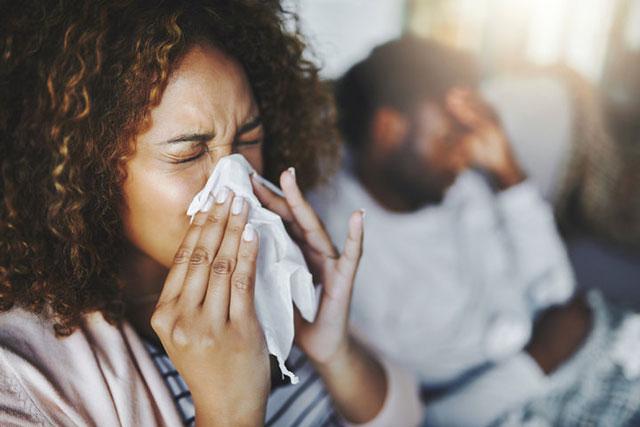You are here
Nearly a third of Jordanians suffer from allergies, allergic symptoms — JMA
By Jassar Al Tahat - Mar 21,2019 - Last updated at Mar 21,2019

Some 30 per cent of Jordanians suffer from some form of allergy or allergic reactions and symptoms, according to the JMA (AFP photo)
AMMAN — “I cannot enjoy spring or flowers or even playing with cute cats because of my allergies. I have to be very careful because if anything triggers my allergies I will spend the whole days sneezing, coughing and feeling disoriented,” said Imad, who suffers from pollen allergies.
Hani Ababneh, president of Jordanian Society for Allergy and Immunology of the Jordan Medical Association (JMA), told The Jordan Times that there is an “increase in allergy patients”.
Jordanians who have allergies or suffer allergic reactions and symptoms comprise now nearly “30 per cent of the population”, he noted.
According to Ababneh, the general indoor lifestyle and the consumption of preservatives and additives in the food and beverages contribute to the condition.
He also underlined that pollution and desertification have a significant impact on allergies, not to mention the lack of awareness on the matter.
The establishment of a national centre has become an “urgent need” in the light of these developments, the medical official said.
The centre would provide services to underprivileged individuals and refugees and offer training opportunities for students and new doctors in addition to raising awareness, Ababneh added.
“We have many concerns [in regards to allergies] at the JMA. Chief among those is the shortage of allergies specialists. In all of Jordan, there are only 10 allergy specialist doctors”, he explained.
He claimed that the association had met with numerous health ministers over the course of years, “nothing was solved”.
Immune therapy for allergies is “very expensive”, he continued to explain.
“A three-year course in the form of drops costs JD150 per month and the six month injection course costs JD500 per injection,” Ababneh exclaimed.
Meanwhile, “Jordan’s healthcare system does not have the capacities to report accurate statistics on allergies due to the wide spectrum of symptoms and the lack of administrative medical capabilities,” former consultant for the World Health Organisation (WHO) Suail Twal told The Jordan Times.
Allergy diagnostic tests can help limit the effect of allergies and provide much-needed knowledge on allergy cases in Jordan, Twal said.
“But it costs more than JD300 per test,” the WHO consultant noted.
There is another test that is more affordable, he highlighted, but “it only detects a limited variety of allergies, unlike the comprehensive test that is much more costly”.
In light of the rising numbers of allergy cases, Twal called on the Ministry of Health to include more allergy patients in the treatment process by lowering the costs of testing and encouraging people to take the test.
When asked about whether the government plans to establish a national centre for allergies, Health Minister Ghazi Zaben said: “No, there isn’t”.
“This is a very complex issue, due [as Ababneh explained] to the wide spectrum of allergies and allergic symptoms and reactions,” Zaben concurred.
More so, “You cannot base a national public health policy on the exceptional, rare instances of serious allergy cases that are terminal. The overwhelming majority of allergy cases are hardly serious or hazardous,” the minister said, in response to Ababneh’s calls.
He also underlined that there are hundreds of known types of allergies, adding that they are seldom ever fatal.
The 7th International Jordanian Congress of Allergy and Immunology is set to be held in August in Amman, while the World Allergy Organisation International Scientific Conference is set to be held in April in Beirut.
Related Articles
AMMAN — The Jordanian Society for Allergy and Immunology of the Jordan Medical Association (JMA) has called for the establishment of a natio
AMMAN – With a quarter of Jordanians — around 3 million — suffering from some type of allergy, experts have been calling for measures to imp
Around 25 per cent of Jordanians, 1.8 million, have allergies, and the number increases annually by 5 per cent, an allergy and immunology specialist said Monday.











